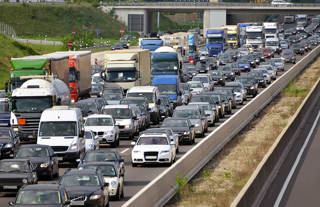Charging employers for providing parking spaces should be considered as one of a number of solutions to reduce air pollution in Manchester, says the Campaign for Better Transport.
Nottingham was the first city to introduce a ‘workplace parking levy’ scheme in 2012 and remains the only local authority to employ the charging regime.
Employers in the city that provide 11 or more workplace parking places are required to pay an annual charge for each parking space on their premises.
However, spaces used by fleet vehicles parked at an employer’s premises, which are not used to travel to and from work, along with vehicles used to deliver or collect goods, are exempt from the charge. Other exemptions include customer parking and disabled spaces.
The levy, which is invested in public transport projects, is set at around £400 per parking space.
In Manchester, alongside the parking levy, possible measures put forward for consideration by Transport for Greater Manchester (TfGM) to tackle air quality concerns include: incentives for greener vehicle use; switching public transport and freight to cleaner fuels; improved cycling and walking infrastructure; and ublic transport improvements.
Helen Smith, head of environment, freight and logistics at TfGM, said: “Air pollution is one of the most urgent issues facing Greater Manchester, affecting health and potentially contributing to thousands of premature deaths in the region every year.
“The Clean Air Plan now under development on behalf of the district councils will look in detail at a wide range of options, but we’re still at a relatively early stage.
“According to a Supreme Court ruling, Greater Manchester is required to consider any measures that could reduce roadside nitrogen dioxide concentrations in the shortest possible time.
“Parking is, therefore, an area that we need to consider and we will be developing feasibility studies that look at parking charges for different times of day and vehicle type, across the region, as well as investigating options for a workplace parking levy.
“These are just some of a number of measures being considered. No decisions have been taken on how best to clean up the air we all breathe in the shortest possible time.”
Campaign for Better Transport says that the scheme in Nottingham has cut congestion, improved air quality and funded much better public transport.
Stephen Joseph, Campaign for Better Transport’s chief executive, said: "Manchester, like other cities, has a pollution crisis - we now know much more about the damage to health being done by vehicle fumes and cities need to take action to tackle pollution. Of course it’s up to the city and its people to take their own decisions, but we hope that the Greater Manchester mayor and councils will at least consider the levy as part of the measures to cut city pollution.
"Nottingham has shown that a levy on parking spaces at work can help tackle city traffic problems - not by clobbering motorists but by getting money for improving alternatives to driving.
"Despite initial local opposition, the levy in Nottingham is now widely supported and has funded two new tram lines and a fleet of electric buses, meaning the city now has among the highest levels of public transport use outside London. It's very different from a congestion charge - it's easier and cheaper to administer and is better targeted, and legally all the money raised has to go on transport.”
Manchester City Council's executive committee is due to consider the proposals on February 7.




















Login to comment
Comments
No comments have been made yet.